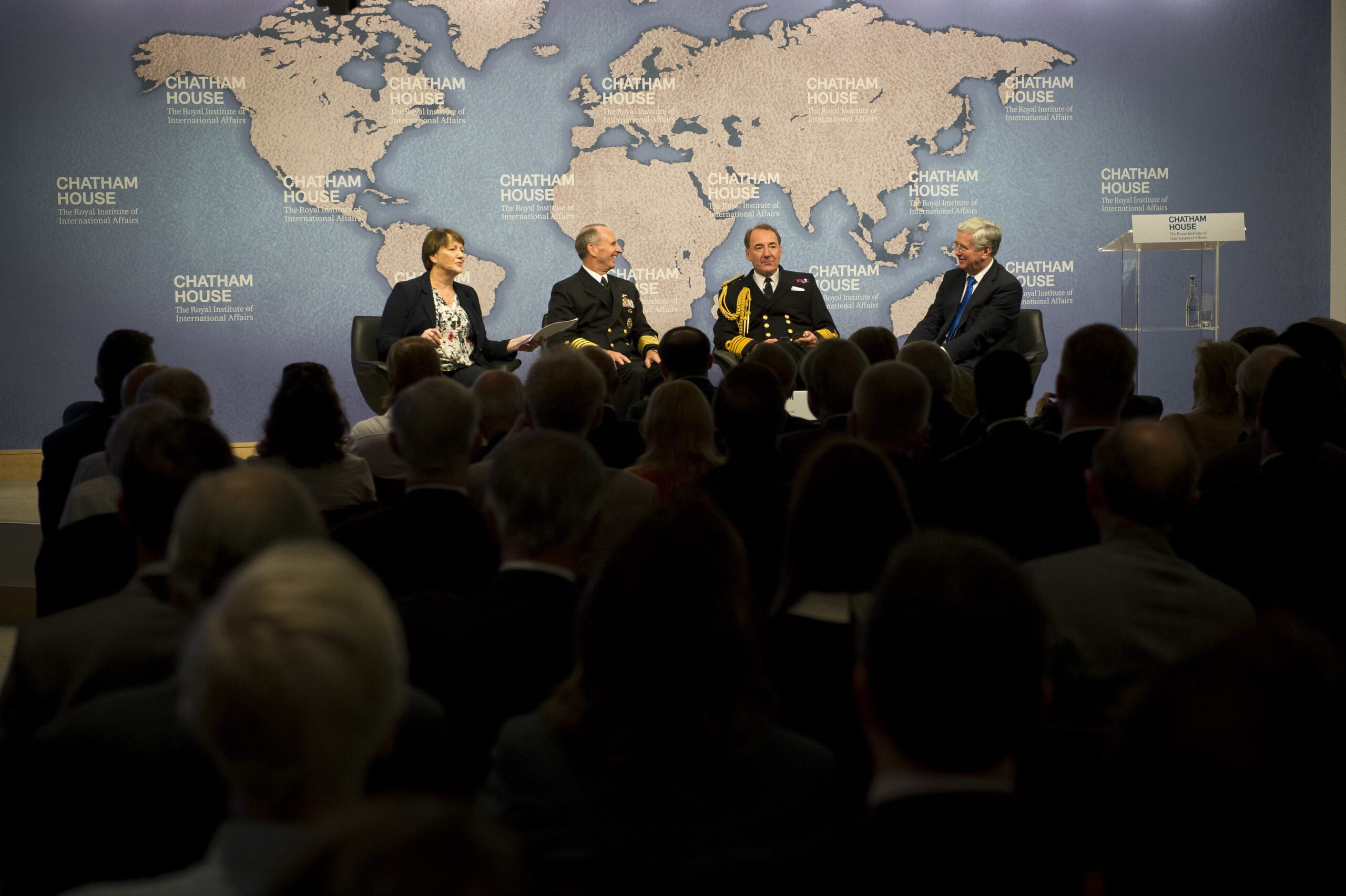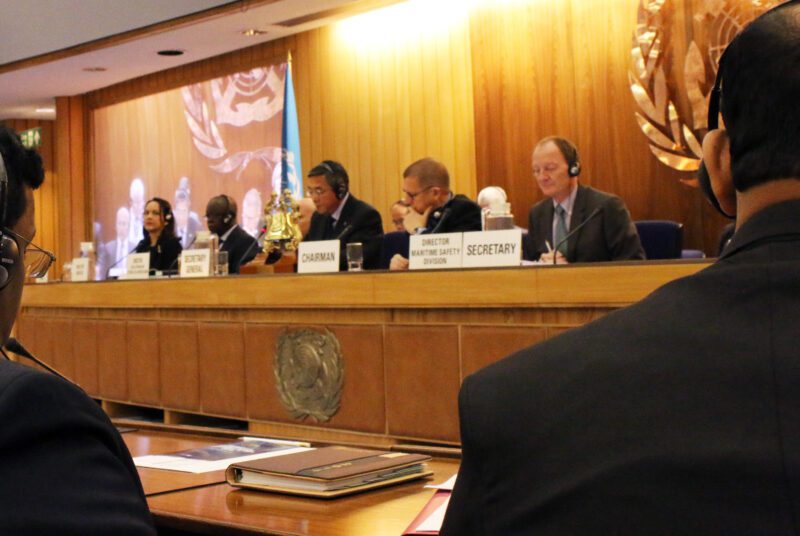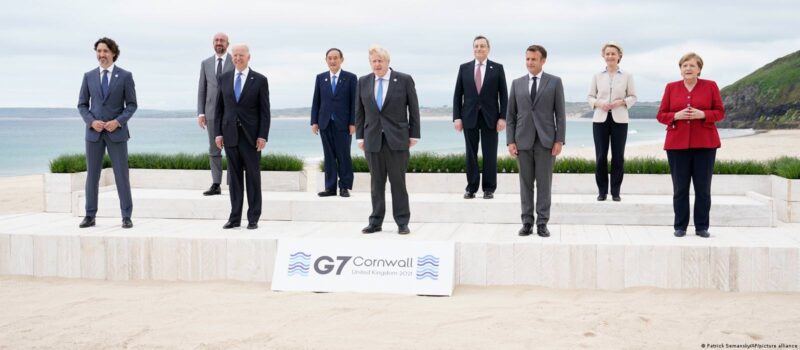Panama Canal Plans to Normalize by 2025, Weather Permitting
As the dry season draws to a close, the Panama Canal Authority (ACP) is adjusting its operations to align with the climate conditions. Taking into account the current and projected...


Dr Patricia Lewis, research director, international security, Chief of Naval Operations (CNO) Adm. Jonathan Greenert, 1st Sea Lord of the Royal Navy Adm. Sir George Zambellas and Secretary of State for Defence, the Rt. Hon. Michael Fallon MP participate in a moderated talk focused on the future of the British-American naval alliance at Chatham House, London. (U.S. Navy photo by Nathan Laird )
Both the G7 and the US-led military coalition have been unsuccessful in protecting trade in the Red Sea, Black Sea and other maritime regions. Is there a more effective alternative?
By John Konrad (gCaptain OpEd) In the Red Sea, the United States has been unsuccessful in persuading most allies to send warships and join its coalition, known as Operation Prosperity Guardian. However, there are powerful tools available beyond military force that are crucial, as some of the most influential maritime nations do not possess large fleets of warships but have significant means of exerting influence to safeguard shipping lanes beyond pure gunboat diplomacy.
In a world that is quickly moving away from globalization, the maritime domain has become a crucial arena for global peace, prosperity, and security. However, there is a concerning lack of leadership in this domain, as it is fragmented across various industry segments, geographic locations, and naval interests. Individual maritime nations struggle to exert significant influence on their own, while diplomats and statesmen primarily focus on land and technology-based solutions. This creates an urgent need for a united front and the resolution of growing problems without resorting to warships. This is where a new organization could thrive. I would like to propose creating the M8, or Maritime 8, an organization inspired by the G7 but dedicated to addressing maritime affairs.
This editorial will explore the benefits of creating a diplomatic coalition and will ask the critical questions:
How would the M8 differ from the G7?
How could the M8 protect trade where the G7 has failed?
How would it serve to navigate the complex waters of international maritime policy, and what criteria should be used to select its members?
The G7 has achieved notable success, but its original purpose as a group representing the world’s largest industrial producers has become outdated due to the shift towards knowledge work and services. Currently, the G7 consists of the seven largest economies by GDP, excluding China and India. However, it lacks the necessary economic influence to effect change in today’s world. Neither industry, knowledge work, nor raw GDP figures provide sufficient leverage to maintain the security of the 90% of cargo tonnage that moves via sea. Instead, the most influential maritime nations hold the key to addressing pressing global challenges.
Today, the oceans are witnessing some of the most significant challenges. Port congestion sparked inflation which the Red Sea conflict threatens to deepen, while maritime sabotage of Nord Stream triggered Europe’s energy crisis. The cutting of Taiwan’s unprotected subsea data cables has exposed the vulnerability of the global internet backbone. Mines in the Black Sea pose a threat to global food security, Chinese naval activities in the South China Sea have put militaries on high alert, the blockade of Taiwan involved naval actions, and tanker seizures and Houthi missiles endanger free trade.
The maritime domain is interconnected with various other critical matters, yet the G7 has faced challenges in identifying effective solutions. Regrettably, their endeavors have occasionally resulted in more harm than good. For example, their notable contribution to maritime diplomacy, which entails imposing oil tanker sanctions on Russia, has created a precarious situation. Admiral James Stavridis refers to it as a “ticking time bomb”. This situation has led to the covert use of an old fleet of poorly maintained tankers that operate without transponders. As a result, these ships can avoid detection, tracking, as well as the insurance, regulation, and national oversight that legitimate commercial ships must adhere to.


After the Cold War, maritime trade thrived the most when there was minimal governmental interference. Diplomats and naval leaders adopted a laissez-faire attitude towards shipping, which enabled private companies to grow extensively. Government intervention was only sought during crises, such as the peak of Somali piracy, and control was promptly handed back to the companies after the situation was resolved (In the case of piracy, through the use of armed private security).
However, the current situation is significantly different. The American merchant fleet has been in precipitous decline and has been targeted by Houthis, while the US Navy has been heavily focused on shifting resources to the Pacific. Additionally, the Navy is facing budget constraints after prioritizing spending on the Army and Air Force during the Global War on Terror. As a result, the Navy is struggling to provide enough warships to protect trade in the Red Sea, Black Sea, and elsewhere. Furthermore, naval leaders and security think tanks, already overwhelmed with understanding broader issues, have limited capacity to support commercial maritime entities. Heightened nuclear threats have also increased concerns about escalation, leading to a cautious approach, especially in regions like the Black Sea. This has left shipping companies, along with their insurance providers, mostly on their own.
“A maritime presence can yield tremendous economic benefits,” says Brent Sadler author of U.S. Naval Power in the 21st Century. “Sadly, U.S. leaders failed to pair the naval presence with economic and diplomatic efforts. Years later, Beijing filled that vacuum, and smaller maritime nations have fallen deep into China’s orbit.“


The G7 has long exemplified how diplomacy can lead to peace and prosperity. However, today – after decades of laissez-faire attitude that fueled unbridled growth in shipping – maritime policy is primarily ignored or handled by anemic government agencies like the US Maritime Administration (MARAD) or junior diplomats at the International Maritime Organization (IMO). As a critical diplomatic body under the UN umbrella, the IMO focuses on maritime affairs but has mostly pivoted in recent decades to be a technical body and currently faces significant limitations and remains configured to handle tactical regulatory issues rather than strategic global trade matters. China continues to usurp influence within UN agencies, including the IMO, which regulates global shipping rules.
The Communist Party of China has a track record of exploiting leadership positions in UN organizations to further its own interests, thereby undermining neutrality and international cooperation. One striking example is China’s manipulation of the International Civil Aviation Organization (ICAO) to block Taiwan’s participation and obscure a Chinese cyber-attack. Now, China is closing in on the IMO, which plays a vital role in global trade, environmental performance, and maritime legal matters.
To preserve the peace and prosperity enabled by the freedom of navigation on peaceful waters, it is crucial for senior diplomats from G7 nations to prioritize an independent, empowered, and strategically relevant International Maritime Organization (IMO). However, while the IMO is essential, we must also elevate our diplomatic efforts to effectively address the complex challenges of the maritime domain. One approach to unite efforts and achieve this goal is by forming the M8.
Unfortunately, this undertaking presents significant challenges. The origin of the G7 can be traced back to March 25th, 1973, when George Shultz, the U.S. Secretary of the Treasury under Nixon, organized an informal meeting of finance ministers in the White House Library. The initiation of the M8 will likely depend on the United States taking the first step. However, American leaders seem to be less connected to the shipping industry compared to their European and Asian counterparts, and US statecraft is currently facing numerous setbacks.
During the G7’s formative years, the U.S. Maritime Administration (MARAD), a powerful entity within the Department of Commerce, stood shoulder-to-shoulder with the Federal Maritime Commission. The shipyard lobby held considerable sway and a dedicated House Committee on Merchant Marine and Fisheries was in full sail. The U.S. Maritime Service was steered by a commandant deeply anchored in the Pentagon and State Department. Yet, today’s landscape is startlingly different. MARAD now sits in the less influential Department of Transportation, maritime concerns are confined to a subcommittee, and our investigation revealed not a single American ship captain within the Pentagon or any major national security or diplomacy think tanks.
Congress could fix some of these problems – most notably by reconstituting a full maritime Senate committee – but we can not address these problems alone and U.S. statecraft has failed to deter events like Russia’s invasion of Ukraine, China’s actions in the South China Sea and attacks on shipping in the Red Sea, while the G7 and United State’s reactive foreign policy based on “integrated deterrence” has proven insufficient. At the core of this problem is the American political leadership’s failure to understand and prioritize the maritime domain. The U.S. needs to rebuild its centers of power and restructure institutions to address challenges from China and Russia effectively. Naval Statecraft, a framework emphasizing naval and maritime power, could leverage America’s advantages in the maritime domain, showcasing U.S. capitalism and governance while delivering prosperity and growth. By integrating military, economic, and diplomatic actions, Naval Statecraft could be the key that unlocks further global peace and prosperity.
“Emphasizing naval and maritime power leverages America’s advantages in the maritime domain and presents our adversaries’ strategic dilemmas,” says Sadler. “Maritime diplomacy and presence can yield tremendous economic benefits. Naval Statecraft offers a framework for successfully competing with adversaries in peacetime, while deterring their worst behaviors. If we fail to recognize that the geostrategic tectonic plates have shifted under our feet, we risk sleepwalking into a war more costly than anything in our nation’s history. ”


And the United States can not do it alone. The US Navy’s fleet of warships is aging, our US Merchant Marine has all but disappeared, our control over Flags Of Convenience set up by American intelligence to control vast numbers of foreign ships has waned, and our investments – and willingness to use American technology – in ports and maritime infrastructure are at low water marks.
The rest of the G7 hasn’t done much better. Germany has mostly ceded its control over maritime finance, France and Italy have prioritized EU maritime interests while Japan has lost a significant percent of its shipyard market share to South Korea and China. London remains the hub of maritime influence but for how long? Only the UK has joined the US in providing military strike capabilities to the Red Sea.
Canada – despite having the world’s longest coastline – spends only 1.4% on defense and a fraction of that money is spent on its Navy. That nation, largely dependent on U.S. military strength, faces serious security challenges in the Arctic due to the failures of the US Coast Guard icebreaker program. While joint US-Canada land and air forces do perform northern exercises, they fly in only limited supplies needed for training. In the event of a real conflict only protected ship convoys could deliver the quantity of fuel and supplies needed to defend Canada in a real conflict. But Canada does not have enough heavy icebreakers, arctic marine infrastructure or ice-class cargo ships either. Canada might be invited to join if it builds icebreakers and boosts its arctic maritime dual-use infrastructure.
The nations of the G7 all have significant maritime interests but they simply do not have the maritime influence needed to solve the growing threat of problems that all originate at sea. For this reason, I suggest the United States welcomes the most influential maritime nations to form the M8, an organization that takes the principles of the G7 but focuses solely on enhancing the competitiveness, and safety of maritime trade.
The question then must be asked who, excluding China and Russia, has the most influence in the maritime domain? Who should be invited to join the M8?
The United States still has the most powerful Navy, a large and growing share of maritime finance, the most publicly listed shipping companies, the closest diplomatic relations with at least two of the largest flags of convenience, and the largest classification society. It should certainly stay.
The United Kingdom too remains an influential nation in the maritime industry with loose control over the tax havens shipping companies love and a wide variety of shipping services. Additionally, the UK’s strategic position and expertise in maritime law and insurance contribute significantly to shaping international maritime regulations and standards, further solidifying its lasting influence in the global maritime landscape.
Japan continues to be a prominent player in the maritime industry, excelling in areas such as shipbuilding, marine technology, and shipping operations. It has extensive marine finance, survey, and insurance networks. Japan relies heavily on its maritime trade, further strengthening its position within the global industry, and is on the front lines of geostrategic competition with China
Who else would qualify for the M8? France and Germany could make a case if they increase naval spending or double down on maritime investment but both come with serious concerns. For France the M8 would first need more clarity on Macron’s visits with Chairman Xi and information on why they have refused US naval command in Operation Prosperity Guardian. For Germany, the first issue is selling a portion of its ports to CCP-controlled companies.
Otherwise, qualifications for the M8 would depend on the metrics our diplomats use to determine nautical influence but first, we must determine who controls the ships. Ostensibly that’s the flag states but most ships are registered under the three largest flags of Convenience; Panama, Liberia, and the Marshall Islands.
Those nations may not qualify if they continue to take a minimalist approach to regulation and control. Actually controlling the ships are the Captains who command them. The largest pools of Captains are in the Philippines, India, China, and Ukraine. Ukraine has bigger problems on its hands right now. India is a G7-sized economy that’s strategically located between China and its largest energy sources while the Philippines borders the South China Sea, has a large fishing fleet, and is already working closely with the US on these problems.
Singapore is a major force in the maritime industry, boasting one of the world’s busiest ports and a strategic location on global trade routes and naval choke points. A hub for maritime services and innovation, Singapore plays a vital role in shaping international maritime policies and regulations.
Corporate and financial control of shipping is critical as well. If you look just at container shipping it’s France (CMA CGM), Denmark (Maersk), and Switzerland (MSC). Switzerland also has deep financial and insurance ties to shipping. If you look beyond just containerships then Norway and Greece are prime candidates. Norway has a strong focus in all maritime silos.
Greece does too but may be unwilling to play ball. Membership in the M8 should not only be based on maritime influence – which Greece has in spades – but also willingness to foster mutual goals, maritime security, and peace. In these metrics, Greece falls short as many of its shipowners have sold into the ghost fleet and Greek diplomats have fought back against G7 sanctions. Including Greece would also upset Turkey which controls an important choke point. But maybe an offer to join the M8 with stipulations would convince Greece to make the difficult decisions it has avoided for too long.
There is no future for maritime diplomacy without the ability to build ships and in shipbuilding, along with location and a history of keeping a cool head with communist neighbors, South Korea dominates.
Other factors for membership could include maritime technology and innovation (e.g. USA, Netherlands, Norway, Israel, Dubai), offshore oil reserves (e.g. USA, Brazil, India Norway, Australia), raw material exports (e.g. Brazil, Australia, Saudi Arabia), food exports (e.g. USA, Ukraine, Indonesia), physical control of choke points (Singapore, Egypt, UK, Panama, South Africa, Taiwan), or arctic influence (USA, Norway, Denmark, Finland, Sweden).
These are all considerations but the crucial question remains: Who holds the most positive influence in the maritime domain, and who should be invited to join this M8? The answer to this question will not be straightforward. It will require a nuanced understanding of naval statecraft, an appreciation for the intricacies of the maritime industry, and a willingness to make difficult decisions.
Ultimately, the task of determining which nations hold the most sway over the maritime domain and how many nations get invited will fall to seasoned diplomats. As we face a future where the oceans will grow increasingly central to global challenges, it’s essential to identify and empower the freedom-oriented maritime nations equipped to lead the charge.
The maritime domain’s importance cannot be overstated, serving as a linchpin for global security, economy, and sustainable growth. Traditional statecraft has failed to appreciate this fully, creating gaps that adversaries are all too eager to exploit. A shift towards a maritime-focused approach isn’t just wise—it’s strategic.
The M8 coalition, if realized, could prove a powerful force for navigating the stormy seas of international maritime policy. This group could possess the maritime influence needed to drive impactful change in the face of escalating maritime threats. Their collective actions could chart a course toward better maritime security, global trade, and sustainable development.
However, the critical question of which nations should join the M8 isn’t easily answered. It will require a deep understanding of naval statecraft, an appreciation for the maritime industry’s complexities, and a readiness to make tough choices. The potential inclusion of a mix of existing G7 nations and others with strong domain knowledge suggests a balanced blend of naval, economic, and strategic influence. But membership in the M8 should go beyond maritime power to a shared commitment to maritime security, peace, prosperity, and trade. The M8 isn’t just an extension of the G7, but an evolution of it—built to confront a new era of maritime challenges and opportunities.
In essence, the M8 isn’t just a proposal—it’s a rallying cry for diplomats, naval leaders, and maritime industry experts. It’s a challenge to rethink our approach to maritime policy and our engagement with the world’s oceans. It’s an invitation to set sail on a new journey—one that could redefine global diplomacy, shape the 21st century, and provide the best means of deterring war.
The solution to problems in the Red Sea cannot rely solely on the exertion of force. It must be achieved through more strategic cooperation among the most powerful and influential maritime nations.
Join the gCaptain Club for curated content, insider opinions, and vibrant community discussions.


Join the 105,892 members that receive our newsletter.
Have a news tip? Let us know.
Access exclusive insights, engage in vibrant discussions, and gain perspectives from our CEO.
Sign Up




Maritime and offshore news trusted by our 105,892 members delivered daily straight to your inbox.



Essential news coupled with the finest maritime content sourced from across the globe.
Sign Up